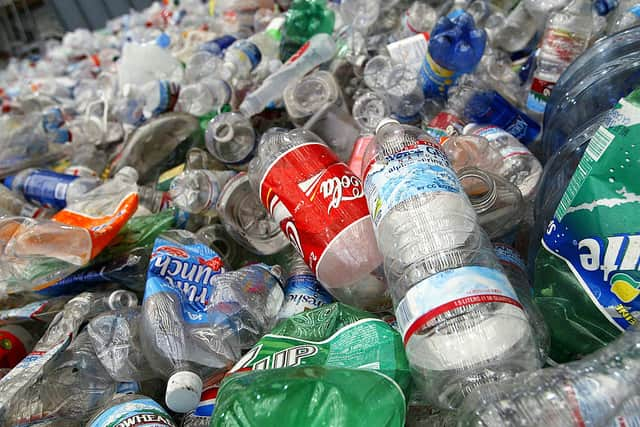7 climate change facts for Earth Day 2022 - from food waste to carbon emissions and plastic pollution
and live on Freeview channel 276
Today (22 April) marks Earth Day, an annual event that gives people around the world the opportunity to focus on the planet and the many challenges it faces - from plastic pollution to the climate crisis.
This year’s theme is “Invest In Our Planet”, encouraging individuals, businesses and governments to invest in technologies and practices that can benefit the Earth.
Advertisement
Hide AdAdvertisement
Hide AdAs experts continue to warn us of accelerating climate change and the irreversible effects it will have on our planet, it’s sometimes easy to feel powerless in the face of it all.
There is some promising news: people in the UK are taking steps to live more sustainable lives by trying to make greener and cleaner choices, according to new data from Google.
Figures from the technology giant’s Search and Maps apps show that in the last year, search queries on how to find more vintage or recycled clothes and get more information on topics such as electric cars have risen significantly.
Here are 7 startling climate change facts to spur you into action.
More than a million species are at risk of extinction
Advertisement
Hide AdAdvertisement
Hide AdAccording to some experts, we are in the midst of the planet’s sixth mass extinction, which is primarily caused by human activities.
Extinction is a natural occurrence, claiming roughly five species a day, but it’s estimated that hundreds of plant and animal species now face extinction daily.
That’s approximately 1,000 times the natural rate; by the middle of the century, 30 to 50% of all species on the planet will have vanished.
Flying at night causes less global warming


We all know that flying is one of the most damaging forms of transport, but in our increasingly globalised world, eschewing air travel completely is often not a feasible solution.
Advertisement
Hide AdAdvertisement
Hide AdBut if you really have to fly, there are still things you can do to minimise your carbon footprint.
Food waste causes more greenhouse gas emissions than the aviation industry
“One of the easiest ways to cut down on food waste is simply to buy what you need and eat what you buy,” says Jamie Crummie, co-founder of surplus food app Too Good To Go.
“The best way to do this is to carry out a weekly fridge and cupboard audit to see what needs eating up, and then make a set shopping list before you go out.”
“It’s a really vital part of protecting our planet.”
Arctic sea ice is rapidly diminishing
We’ve lost roughly 28 trillion tonnes of ice since the mid-1990s, with a current melt rate of 1.2 trillion tonnes per year.
Advertisement
Hide AdAdvertisement
Hide AdTo put it in perspective, the total weight of all human-made objects is 1.1 trillion tonnes.
Climate change impacts human life
This may seem obvious, but with so much focus on the effects climate change has on habitats and the vast array of species that inhabit them, it can be easy to forget the immediate impact on human life it has too.
According to a 2018 study published in The Lancet, rising temperatures, along with an increase in the number of people living in cities and an ageing population, have resulted in a rise in heat-related mortality.
Higher temperatures wreak havoc on air quality, reduce crop yields, accelerate the spread of infectious illnesses, and jeopardise freshwater reserves. Natural disasters also get more intense as the planet warms.


700,000 plastic bottles are littered every day in the UK
Advertisement
Hide AdAdvertisement
Hide AdIf you want to ensure you’re not contributing to that astronomical amount, switching from a single use plastic bottle to a reusable one is a simple first step.
And with so many stylish, collapsible and foldable options on the market, there’s a convenient option for everyone.
There’s more CO2 in our atmosphere than at any time in human history
Sensors at the Mauna Loa observatory in Hawaii, which has been tracking CO2 concentrations in the atmosphere since the late 1950s, detected CO2 values of more than 417 parts per million in February and March 2021.
In comparison to the time between 1750 and 1800, pre-industrial levels of CO2 in the atmosphere were 278 ppm, implying that humans are halfway to doubling the quantity of CO2 in the atmosphere.
No major world economy is on track to meet Paris Agreement pledges
Advertisement
Hide AdAdvertisement
Hide AdDespite the fact that the Paris Agreement has been in existence for six years, none of the world’s major economies is on track to limit global warming to 1.5 degrees Celsius above pre-industrial levels.
The countries that contribute the most to global emissions have the best chance of preventing climate change, but their leaders are doing little to address the problem.
Comment Guidelines
National World encourages reader discussion on our stories. User feedback, insights and back-and-forth exchanges add a rich layer of context to reporting. Please review our Community Guidelines before commenting.
